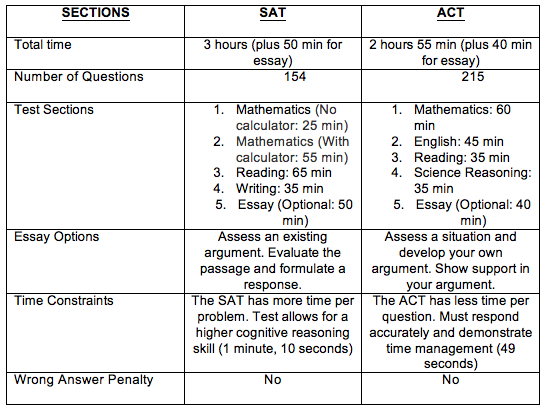|
Why Students Need to Take the SAT or the ACT Test: If you are contemplating studying in the USA, you're probably asking yourself, "What are the most important steps that I need to take in order to get there?” Well, taking the SAT or ACT test is a must. Students have a choice of which test they can take, however, you will not be able to study without completing at least one of these tests. The main reason why students are required to take these tests is because academic standards vary from schools and countries. University administrators understand this and use these tests to evaluate students academic ability based on the American high school curriculum. The Differences Between the SAT and the ACT: The differences between the two tests are quite subtle. The SAT and ACT both cover, English, Math and Writing. The difference occurs with the ACT, which has a 4th section covering science. This 4th section has created the perception that the ACT test is the harder of the two tests, and students should consider this when choosing Scoring:
The SAT has two main sections (Reading & Writing and Mathematics with an optional essay section). Each section is worth up to 800 points. A perfect score is equal to 1600 points. The ACT has four sections (English, Mathematics, Reading Comprehension and Science, with an optional essay section). Each section is out of 36 points. Each section is added together and averaged to get your composite score. Example: If you scored 24 in Math, 23 in Science, 26 in Reading and 25 for English. Your average would be 24.5, which is rounded up to 25. ([24 + 23 + 26 + 25] / 4 = 24.5) What is a good Score? A good SAT score is anything above 1250/1600, however, if you are looking to get into one of the top 100 colleges or an Ivy League University, you will need to score above 1450/1600. A good ACT score is 26 out of 36, which would put you in the 80th percentile. The 80th percentile does not mean you scored 80% on the test; it only means you scored higher than 80% of other students who wrote the ACT. If you are looking to get into one of the top 100 universities, you will need to score above 33/36, which will put you in the 99th percentile. Subject Tests: The SAT Subject Tests are designed to examine a student’s knowledge of a specific area of study. These tests are generally optional and should only be taken by students looking to demonstrate their high academic pedigree as they help with admission into elite colleges. Certain universities do require the Subject Tests, for example, Brown University requires the SAT & 2 SAT Subject Tests. The subject tests that are offered are: Mathematics, Science, English, History and various languages. These tests are all an hour long and are scored out of 800. Important Notes when making a decision:
3 Comments
16/10/2018 09:27:27 am
Why not, with the intrusion amid the discussion amid the classroom ruins the earth of the classroom. It's not possible for anyone to listen deliberately what is being talked about and what to react to it.
Reply
6/1/2024 08:41:53 am
What are the main reasons students are required to take the SAT or ACT tests, especially if they are considering studying in the USA? Could you outline the differences between the SAT and ACT tests, and what factors students should consider when deciding which test to take? regard <a href="https://sas.telkomuniversity.ac.id/en/">Telkom University</a>
Reply
24/4/2024 05:27:11 am
There are some points that I don't understand in this article, can they be clarified for other articles? visit our : <a href="https://journal.telkomuniversity.ac.id/">telkom university</a>
Reply
Leave a Reply. |
Tyler H.Co-Founder Archives
March 2017
Categories |

 RSS Feed
RSS Feed